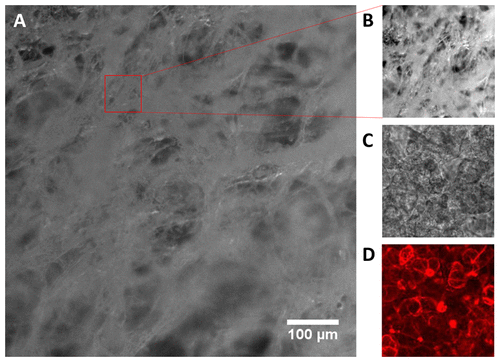当前位置:
X-MOL 学术
›
ACS Biomater. Sci. Eng.
›
论文详情
Our official English website, www.x-mol.net, welcomes your
feedback! (Note: you will need to create a separate account there.)
Novel Microfluidic Colon with an Extracellular Matrix Membrane
ACS Biomaterials Science & Engineering ( IF 5.4 ) Pub Date : 2018-02-21 00:00:00 , DOI: 10.1021/acsbiomaterials.7b00883 Chengyao Wang 1 , Nida Tanataweethum 1 , Sonali Karnik 1 , Abhinav Bhushan 1
ACS Biomaterials Science & Engineering ( IF 5.4 ) Pub Date : 2018-02-21 00:00:00 , DOI: 10.1021/acsbiomaterials.7b00883 Chengyao Wang 1 , Nida Tanataweethum 1 , Sonali Karnik 1 , Abhinav Bhushan 1
Affiliation

|
Collagen is a key element of basal lamina in physiological systems that participates in cell and tissue culture. Its function is for cell maintenance and growth, angiogenesis, disease progression, and immunology. The goal of our present study was to integrate a micrometer resolution membrane that is synthesized out of rat-tail type I collagen in a microfluidic device with apical and basolateral chambers. The collagen membrane was generated by lyophilization. In order to evaluate the compatibility of the resulting membrane with organs-on-chips technology, it was sandwiched between layers of polydimethylsiloxane (PDMS) that had been prepared by replica molding, and the device was used to culture human colon caco 2 cells on the top of the membrane. Membrane microstructure, transport, and cell viability in the organs-on-chips were observed to confirm the suitability of our resulting membrane. Through transport studies, we compared diffusion of two different membranes: Transwell and our resulting collagen membrane. We found that mass transport of 40 kDa dextran was an order of magnitude higher through the collagen membrane than that through the Transwell membrane. Human colon caco 2 cells were cultured in devices with no, Transwell, or ECM membrane to evaluate the compatibility of cells on the ECM membrane compared to the other two membranes. We found that caco 2 cells cultured on the collagen membrane had excellent viability and function for extended periods of time compared to the other two devices. Our results indicate a substantial improvement in establishing a physiological microenvironment for in vitro organs-on-chips.
中文翻译:

具有细胞外基质膜的新型微流控结肠。
胶原蛋白是参与细胞和组织培养的生理系统中基底层的关键元素。它的功能是用于细胞维持和生长,血管生成,疾病进展和免疫学。我们当前研究的目标是在具有顶腔和基底外侧腔的微流控设备中集成一种由微米级分辨率的膜制成的膜,该膜由鼠尾I型胶原合成。冻干产生胶原膜。为了评估所得膜与片上器官技术的相容性,将其夹在通过复制成型制备的聚二甲基硅氧烷(PDMS)层之间,并将该设备用于在膜上培养人结肠caco 2细胞。膜的顶部。膜微结构,运输,观察到片上器官中的细胞活力,以证实我们所得膜的适用性。通过运输研究,我们比较了两种不同膜的扩散:Transwell和我们产生的胶原膜。我们发现,通过胶原蛋白膜的40 kDa右旋糖酐的质量传递比通过Transwell膜的质量传递高一个数量级。在无膜,Transwell膜或ECM膜的装置中培养人结肠caco 2细胞,以评估与其他两种膜相比,ECM膜上细胞的相容性。我们发现,与其他两种设备相比,培养在胶原膜上的caco 2细胞具有出色的生存能力和功能。我们的结果表明,在建立体外片上器官的生理微环境方面有了实质性的改善。
更新日期:2018-02-21
中文翻译:

具有细胞外基质膜的新型微流控结肠。
胶原蛋白是参与细胞和组织培养的生理系统中基底层的关键元素。它的功能是用于细胞维持和生长,血管生成,疾病进展和免疫学。我们当前研究的目标是在具有顶腔和基底外侧腔的微流控设备中集成一种由微米级分辨率的膜制成的膜,该膜由鼠尾I型胶原合成。冻干产生胶原膜。为了评估所得膜与片上器官技术的相容性,将其夹在通过复制成型制备的聚二甲基硅氧烷(PDMS)层之间,并将该设备用于在膜上培养人结肠caco 2细胞。膜的顶部。膜微结构,运输,观察到片上器官中的细胞活力,以证实我们所得膜的适用性。通过运输研究,我们比较了两种不同膜的扩散:Transwell和我们产生的胶原膜。我们发现,通过胶原蛋白膜的40 kDa右旋糖酐的质量传递比通过Transwell膜的质量传递高一个数量级。在无膜,Transwell膜或ECM膜的装置中培养人结肠caco 2细胞,以评估与其他两种膜相比,ECM膜上细胞的相容性。我们发现,与其他两种设备相比,培养在胶原膜上的caco 2细胞具有出色的生存能力和功能。我们的结果表明,在建立体外片上器官的生理微环境方面有了实质性的改善。











































 京公网安备 11010802027423号
京公网安备 11010802027423号